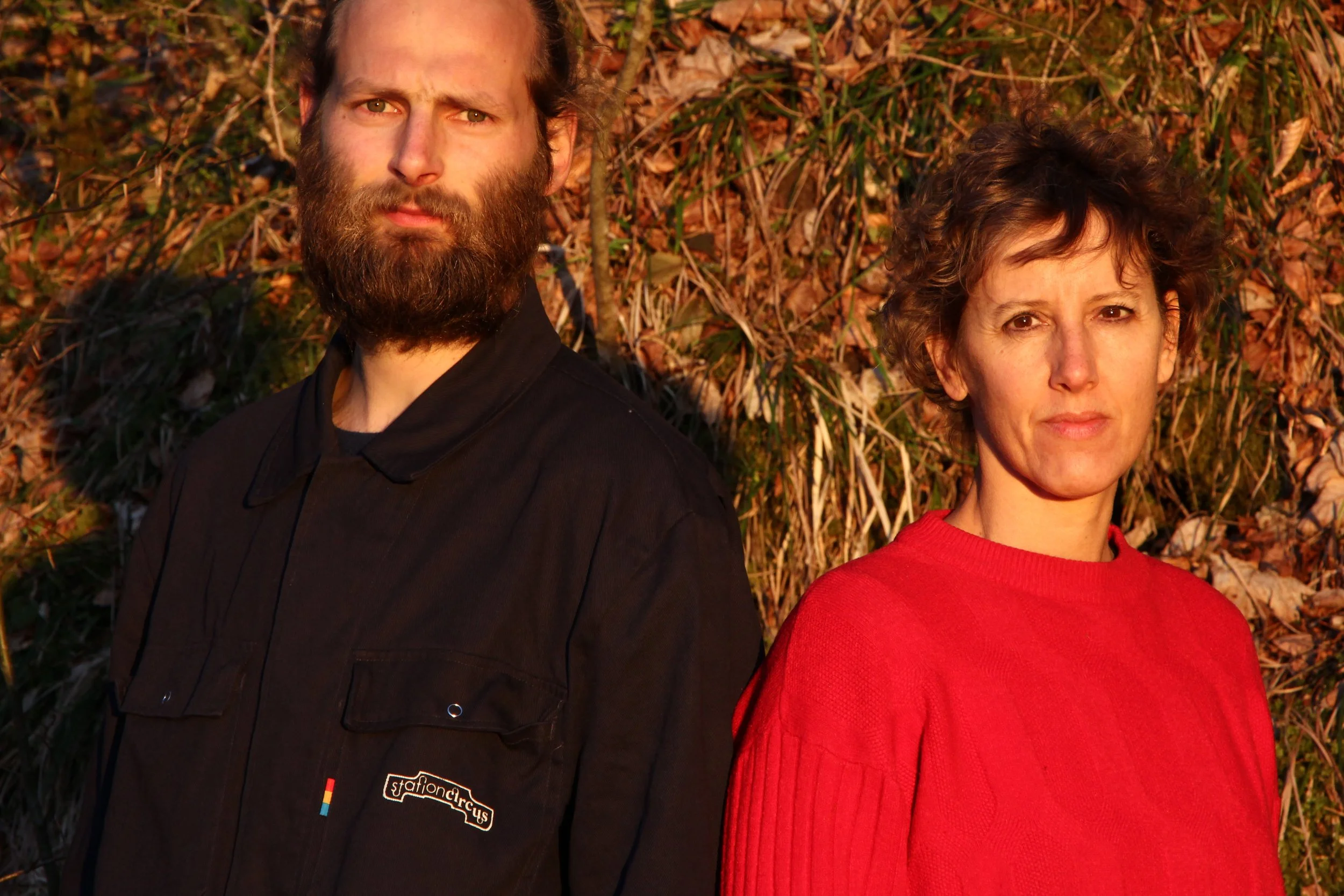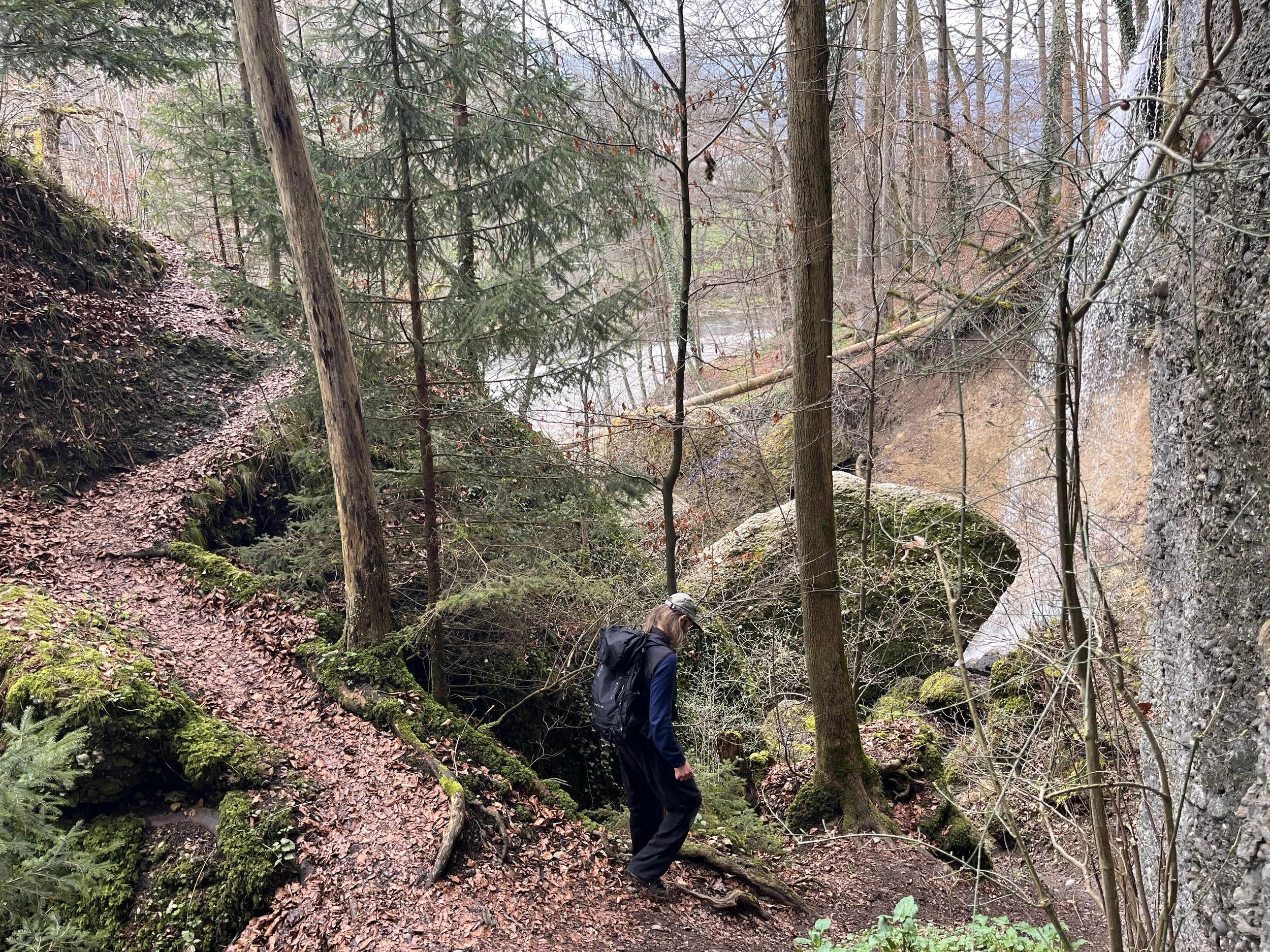WONDERING HORIZONS
LAURA ARIS & JAKOB JAUTZ
WONDERING HORIZONS is an artistic pilgrimage: a contemporary dance and physical theatre research project that thrives on the stories that speak of and to the land and its inhabitants.WE AIM TO TRANSFORM THE PATH EXPERIENCE INTO AN ARTISTIC EXPRESSION.
This journey is not about us, but moves through us.
We don’t go out looking for answers; instead, we open conversations.
We embody the Path. We are the vessels of our own experiences, but how do we make the echoes of the journey last?
We do not know, but this project might be nothing more (and nothing less) than the first step.
Throughout a 15-day journey on foot from Tübingen to Freiburg, through the Black Forest, and from Villa Nueva de Santo Adriano (near Oviedo, Asturias)to Santiago de Compostela (Galicia), Jakob Jautz and Laura Arís collect impressions of landscapes, encounters, and environmental conditions, translating them into the language of dance, music, and physical theatre. The stories gathered along the way, as well as the voices of the cultural landscape —both human and non-human- are an essential part of the performance.A dance piece with many faces, it creates space for encounter and exchange, consciously embracing a state of constant transformation and becoming, echoing the spirit of walking.
Walking as a physical, intellectual, and poetic act of critical yet sensitive resistance, which, despite a dystopian present, evokes feelings of hope and connection.performance DATES:
26 July 2025 at Südufer E-Werk, Freiburg, at 8pm
27 September 2025 at Cidade da Cultura de galicia, Santiago de compostela, at 7pm
Shows & Workshops
Join us!
|
Shows & Workshops Join us! |
presentation
Wondering Horizons centres on the practice of walking, fostering creative exchange with the land and its inhabitants, both human and non-human, and gathering artistic material along the way.
Two parallel pathways are planned. Both are heading towards a venue and a final performance. Cidade da Cultura de Galicia, Santiago de Compostela, Spain. Cultural Center E-Werk in Freiburg, Germany.
The Walk is considered an itinerant artistic project based on the body language of contemporary dance and physical theatre.
Objectives
By leaving enclosed dance studios and taking our practice outdoors, hiking for 16 consecutive days to a theatre, we proactively engage with the environment, its inhabitants (human and non-human), the climate, and the historical, social, and multicultural legacy of the walking routes.
Wondering Horizons explores the relationship between sustainable, resilient, creative processes in and with the cultural landscape that we are part of. The daily long-distance walks (in the mornings) and the rehearsals (in the afternoons) will complement and influence one another. Both are part of an ongoing process of transformation and becoming, hence reflect the constant change that is inherent to our planetary ecosystem. This will manifest in our choreographic and compositional choices and will give the audience the chance to bodily experience the stories of the pathway.
The project's itinerant nature, with its phases of Pre-trail, On-trail, and Post-trail residencies, mirrors nomadic practices and offers a distinctive method of creation and presentation. Combining the process in 2 different geographic and cultural contexts (Spain and Germany) provides a comparative dimension and broadens the project's scope and impact.
WE CHOSE TO REMAIN HOPEFUL
Despite the dystopian present of multiple crises, Wondering Horizons is a performance that conveys hope and a sense of connection. We want to move away from a language steeped in the rhetoric of war and catastrophe towards constructive narratives, without kitschifing nature or falling into a reactionary "back to nature" rhetoric. Hope needs space to accommodate grief over the current situation, the loss of species, people, and ecosystems, as much as the fascination and appreciation of the richness of the connections that exist on Earth.
Wondering Horizon aims to stimulate the imagination, choosing to remain hopeful as an essential first step in shaping the future. This step is rooted in artistic-body practices that constitute sensorial knowledge, with its own rigour and depth.Furthermore, it is an example of how performing arts can be created not only in theatre spaces, but also in free dialogue with the world, even outside the cultural hubs of our cities.
Interventions and participation activities along the walk promote intercultural encounters and strengthen the connection between local communities and contemporary art. Public workshops for local artists and the dance scene, as well as introductory formats suitable for non-professionals, are an elementary component of the project.
“On pilgrimage, human beings produce architecture and landscape, forms of space where it is possible to inhabit the world through the senses and sensorialities that make it possible for new forms of the world to occur bodily”
Methodology - Walking as Creative Practice
Wondering Horizons challenges the presumed sedentary way of inhabiting this planet, drawing inspiration from wayfaring as a primal way of how animals, including humans, shape and are shaped by the world. Referring to hunter-gatherer cultures—where the pathway and the traveller continually influence one another—we approach walking as a process of becoming.
As collectors and carriers, we gather experiences along the way: shifting weather, fatigue, conversations, sounds, images, encounters, and thoughts—all of which sculpt our artistic output. The simplicity of movement compels us to focus on the essential, stripping us down to what is present. Consecutive long-distance walking forces us to carry only what we need, giving everything multiple functions and meanings—a principle that extends into our choreographic choices. Nothing can be wasted; every movement must carry intention and depth. The path itself will shape the work.
Walking silently, we absorb the journey, allowing our bodies to register and process the experience. When reaching the day’s resting place, these impressions take their first artistic forms, shaping the dance that emerges from the pilgrimage.
The artistic research extends beyond the dialogue between the artists and the natural environment. It encompasses inevitable encounters with other people, including both pilgrims and residents of the lands traversed. Our journey plans interventions in villages along the way that will be documented.
From Walking & Dancing
From bipedal walking 3.6 billion years ago to 20th-century political marches, walking has evolved with diverse motives and paths. Dancing and walking share a deep connection –both require controlled weight transfer, balance and rhythm. Every dance step is a sophisticated form of body coordination, similar to walking but elevated to an art form. By transforming walking into an artistic practice, intentional wandering becomes a profound philosophical and intuitional experience of great evocative power.
“Slowness means cleaving perfectly to time, so closely that the seconds fall one by one, drop by drop like the steady dripping of tap on stone. This stretching of time deepens space. It’s one of the secrets of walking: a slow approach to landscape that gradually renders them familiar. Like the regular encounters that deepen friendship.
”
Post-trail Residence & Performances
Upon arrival at the cultural houses, the Post-trail residency begins: a time to craft the echoes of the walking experience into a full performance. We will reunite with music and sound-landscape composers Jorge Da Rocha (in Spain), Jakob Schall and Maximilian Langer (in Germany), who have accompanied the project throughout the artistic pilgrimage. In Freiburg, Jakob Schall will accompany the dance together with two members of EineArtEnsemble, who will be part of the final performance.
Future Horizons
The final presentation will be a dance performance enriched with live music, audiovisual elements and texts. By combining fixed choreography and improvisation, we leave room for spontaneity and the unexpected – essential aspects of both walking and artistic creation – and thus emphasise the adaptive and experiential nature of the project.
Wondering Horizons is designed to evolve beyond the first two performances and to provide a foundation for future iterations. The walk to the theatre will remain a core element, although the length of the journey can be adapted to different contexts.
The experience gained will be shared beyond the stage through workshops and educational encounters, where concepts such as landscape-based choreography, the relationship between walking and dancing, and sustainable artistic production will be explored. Wondering Horizons workshops are an essential extension of the artistic and philosophical exploration of the project. We aim to create encounters that connect us with the dance community in the territories we inhabit.
Credits
Project initiated by Laura Arís
Developed and co-created by Laura Arís, Jakob Jautz
Wanderers | performers: Laura Arís, Jakob Jautz
Original Music (E-Werk, Germany): Jakob Schall, Maximilian Langer
Original Music (Cidade da Cultura de Galicia, Spain): Jorge da Rocha
Technology/lighting (E-Werk, Germany): Bo Müller
Outside Eye (E-Werk, Germany): Lola Vera
Pre-trail Residencies: Ultima Vez, Dogo Residenz | Rathaus für Kultur
Forests pre-trail residencies: Laarbeekbos in Jette (Brussels), and the forests surrounding Lichtensteig (Switzerland).
Production: Laura Arís, Jakob Jautz
Project initiated by Laura Arís
Developed and co-created by Laura Arís and Jakob Jautz
Wanderers | performers: Laura Arís, Jakob Jautz
|Original music score and performance: Jakob Schall, Maximilian Langer
Technology | lighting: Bo Müller
Outside Eye: Lola Vera
Pre-trial Residencies: Ultima Vez asbl, Dogo Residenz | Rathaus für Kultur
Forests pre-trail residencies: Laarbeekbos in Jette (Brussels), and the forests surrounding Lichtensteig (Switzerland).
Production: Laura Arís, Jakob Jautz
This project was made possible thanks to the project funding of the Landesverband Freie Tanz- und Theaterschaffende Baden-Württemberg (LaFT BW) e.V., the Ministry of Science, Research and the Arts Baden-Württemberg, LBBW Foundation, la Xunta de Galicia (Galician Regional Government) through the Fundacion Cidade da Cultura de Galicia, and the Gaiás Artistic Residency Programme, The Tomorrow Tribe, and E-WERK Freiburg e.V.
With kind support from:
Germany: Gasthof Hotel Goldener Adler, Theater am Torbogen, Hotel Pfaff (Oliver), Landgasthof zum Schwanen, Ochenhof (Almud), and Gullerhof (Cristhop & Bigi).
Spain: PAM Asociación de profesionales das artes do movemento de Galiza, Sala Sabil, La Escanda Mitológica, L’ Abellugu, Arqueixal-ecoagroturismo
Special thanks to: Kirenia Martínez Acosta, Mònica Arús, Marcia Bázquez Ramírez, Familie Lukowicz / Zindel, Paul Willi, Anna Stelzner, and Wolfgang + Gertrud Jautz.
To the landscapes we crossed and the encounters along the way, which made the piece become what it is today.
A B O U T T H E W I lL
& T H E I M P U L S E
From the practice of dance, as performers and creators, we are accustomed to exposing our bodies—our primary instrument—to situations that require great mastery and control, both physical and mental. Therefore, it is unsurprising that, as dancers, we are drawn to the physical and psychological challenge of pursuing this Creative Path.
We do not intend to walk in search of cathartic answers, but rather to raise new questions about our bodies, our artistic work, and the various ways we occupy the space we inhabit.From a poetic-narrative perspective, we could define dance as poetry in action, writing with the body. And poetry, says Wordsworth, "is the image of the human being and nature".
We are interested in leaving the conventional (aseptic) indoor spaces for the rehearsal and creation of contemporary dance performances, with the desire to establish a dialogue with the open space and outdoors.
Let ourselves be impregnated by the richness of the natural landscapes and the historical, social, and multicultural legacy of one of the oldest routes that make up the network of Jacobean roads. As Le Breton so beautifully puts it:
“‘On the pilgrimage, the senses are cleansed of routine; another way of inhabiting the world is discovered.’
”
Ours will be a sensitive walking, driven by the desire to reinvigorate the senses: to contemplate, listen, smell, touch, and appreciate the time that El Camino will impose on us. In this way, we will (re)build ourselves by walking, letting our thoughts dance, and looking for new stimuli for imaginative play —a time to recalibrate our artistic practice.
Likewise, the experience of being travellers is part of our identity, as the reality of our profession entails a nomadic lifestyle.


















